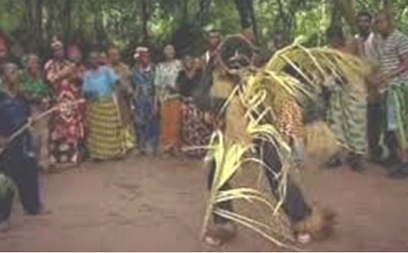
Women and Masquerade Traditions in Africa: Insight from the Ikeji Masquerade Cult of the Post-Colonial Igbo Society, Nigeria
Abstract
The masquerade is a traditional mask festival and celebration for native Africans and an integral part of African culture and traditions. One example is the Ikeji masquerade tradition, celebrated by the Aros and their neighbors in the post-colonial Igbo society of Southeast Nigeria. According to the literature, extant cultures forbid women from participating in the Ikeji masquerade cult, and some other masquerade cults in parts of Africa. However, the results of a pilot study contradict this assertion. Using an ethnographic approach, including autoethnography, with participant observation and key informant interviews in seven traditional Nde-Eni Asaa communities in the Orumba North Local Government Area of Anambra State, Nigeria, this study established that women play a significant role in relation to the Ikeji masquerade cult in Nde-Eni Asaa communities. Moreover, propositions of postmodern feminism aided the study in further establishing that specific examples (and not general assumptions) should be considered for women among Nde-Eni Asaa communities and in some other traditional communities in post-colonial Igbo society. This study makes significant contributions to the existing knowledge and literature on the position of women in the preservation of African culture and traditions in the twenty-first century and relevance of women in post-colonial Igbo society and other parts of Africa, where the positions of women in culture and tradition are still contentious.
Keywords:
Ikeji masquerade cult, women, Nde-Eni Asaa, postmodern feminism, postcolonial Igbo societyIntroduction
In March 1989, there was a traditional initiation into the famous Ikeji masquer cult in Ndiowu, a community in Nde-Eni Asaa in the Orumba district of Anambra State, Nigeria. Many members of the dreaded masquerade cult gathered for the initiation ceremony, seen as a hallmark of the Ikeji in the community. During the initiation ritual, the secrets and practices of the masquerade cult were revealed to the new entrants. Some people from neighboring communities, including Ajalli, Ndikelionwu, Ndiowu, Ndiokpaleke, Ndiokpaleze, Ndiukwuenu, and Ndiokoro—also part of Nde-Eni Asaa—were present to participate in the ritual. Moreover, while performing the ritual, women (Umuada [daughters] and Anutara-di [married women]) remained behind the house preparing a local dish known as abacha-ncha with special traditional condiments, a food said to be unique to these rituals.
However, oral traditions from these communities and some studies, such as Ijoma (1994), Onwuejeogwu (1987), Afigbo (1981), Jones (1981), Isichei (1973), Northrup (1978), and Nwokeji (1999), have paid significant attention to cultural debates on Aro hegemony and history, including debates and narratives regarding the exclusion of women from the Ikeji masquerade cult. This has generated a pertinent question: Are women involved in the Ikeji masquerade cult despite the fact that the existing narratives and literature deny this possibility? This question is the focus of this study.
The Ikeji masquerade cult is a traditional masquerade festival in the region of the now-defunct Aro hegemony (see Figures 1 and 2). The Aros are the Arochukwu people of Abia State and other diasporic Aro communities within the Igbo lands and beyond, established by the Arochukwu people during the Aro Conquest. History has it that Arochukwu warriors from Abia State conquered over one hundred and fifty communities in parts of Nigeria, extending as far as some communities in Cameroon and Equatorial Guinea (Okoro, 1985; Nwokeji, 1999; Nwaezeigwe, 2013). These communities formed the Aro hegemony, which lasted from 1690 until the British invasion of 1901.
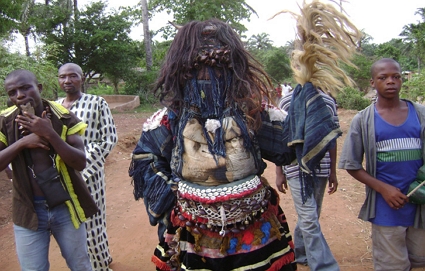
Ikeji masquerade and members of the cult in Arochukwu, Abia State. (Retrieved March 20, 2023 from https://theeasternupdates.com)
The Ikeji festival was and remains a formidable factor in intergroup relations among communities within the hegemony (see Nwokeji, 1999; Njoku, 2016). Moreover, Ikeji is a masquerade festival that celebrates the arrival of the new farming season among the Aro-Uno (the main Arochukwu community in the present-day Abia State, Nigeria) and Aro-Ezi (those communities that became part of the Aro hegemony; see Kanu, 2017; Okoronkwo & Okorafor, 2019). The Ikeji festival has also been positioned in the extant literature as an instrument of entertainment and intergroup relations for communities in the former Aro hegemony in southeast Nigeria (see Bentor, 1995; Nwanna, 2017; Kanu, 2017; Okoronkwo & Okorafor, 2019). Based on evidence from the culture and traditions of the people, the masquerade cult is said to be exclusively reserved to men (see Dike & Ekejiuba, 1990; Bentor, 1995; Okonkwo, 2011; Njoku, 2016; Nwanna, 2017; Okoronkwo & Okafor, 2019).
Nde-Eni Asaa is a collective name for seven traditional communities in the Orumba district of Anambra State, Nigeria, comprising Ajalli, Ndikelionwu, Ndiowu, Ndiokpaleke, Ndiokpaleze, Ndiukwuenu, and Ndiokoro. These traditional communities were said to have been established by the Aro during the expansion of their hegemony into the hinterlands before the eighteenth century (Dike & Ekejiuba, 1990; Okoronkwo & Okorafor, 2019). These communities practice the Ikeji masquerade cult in the same way as other communities in the defunct Aro hegemony and his has helped them to strengthen intergroup relationships.
Two distinct groups of women exist within these Nde-Eni Asaa communities: Umuada (daughters) and Alutaradi (married women). The Umuada are women who were originally born into these communities and are therefore community members by birth (see Figure 3 below), whereas the Alutaradi are those who have married into these communities (see Figure 4 below). The salient roles of these two groups of women in politics, culture, and intergroup relations are sometimes devalued and ignored in narratives due to the patriarchal structure of Igbo culture and tradition (Amaechi & Muo, 2018).
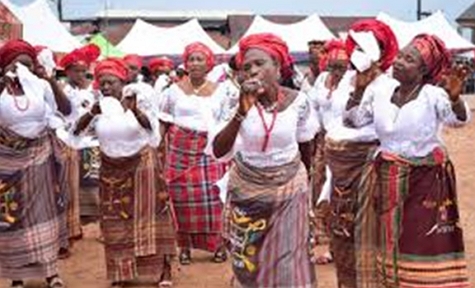
A group of Umuada (daughters) in the Arochukwu community (Retrieved March 21, 2024 from https://m.facebook.com/MouthpiecemediaTV/)
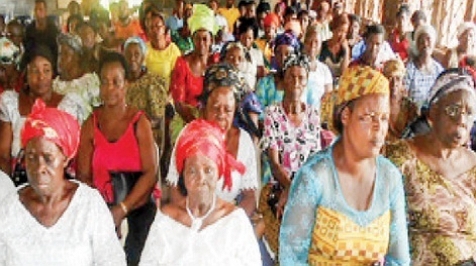
A cross-section of Alutaradi (married women) in the Ndiowu Community. (Retrieved March 24, 2023 https://sunnewsonline.com/ndiowu/)
However, the reality of these critical concepts has been misinterpreted in gender studies, mostly in relation to local cultures. For example, feminism postulates gender equality between men and women (Mendus, 2005; Roberts, 2017). This concept in gender studies implies that both genders should be treated equally and without discrimination. This concept was aimed at repositioning the demeaning position of women in society, which is dominated by male ideologies. Many cultures in traditional African society are at odds with this concept; hence, women are traditionally meant to be subordinate to men in African cultural settings. However, in an attempt to address some of the weaknesses of classical feminism, modern feminism postulates “gender equity” as opposed to the “gender equality” championed by traditional feminism. This recognizes the peculiarities of the two genders and posits that each gender should be accorded its rights and privileges based on its nature and peculiarities (Gambaudo, 2007; Artwinska & Mrozik, 2020). Modern feminism therefore defends the peculiarities of gender within a given space. Unlike traditional feminism, modern feminism attempts to solve the variance between African culture and feminism; hence, it repositions women in a more effective way in African society.
Post-modern feminism, an extension of modern feminism, seeks to harness women’s respective contributions to collective responsibility. It postulates that the collective impact of women will be better understood by considering their individual differences and how these individualities contribute to collective success (Linda & Salo, 2002). It further argues that women differ in attitude, conduct, appearance, thought, risk-bearing, imagination, strength, and position (Maynard, 1995). Taking this into consideration will enable social analysts and anthropologists to understand that women have peculiarities and should be viewed from their respective individual perspectives. Moreover, among the premises of postmodern feminism is the belief that most traditional practices that have debased the role or position of women in social contexts without considering the respective differences of these women should be rejected; these traditional practices are patriarchal norms designed by men to impose gender inequality on women as a single whole, seen as lacking individual differences. This school of thought, led by Judith Buttler in her book Gender Trouble published in 1990 , is concerned with analyzing the arguments or propositions that gave rise to gender inequality in gender discourse (see also Roseneil, 1995).
The Ikeji masquerade cult has been presented as the exclusive reserve of men in literature and narratives. For instance, it has been accepted among the communities that it is taboo for a woman to know or have anything to do with the Ikeji masquerade cult (Bentor, 1995). This view is also framed by traditional folklore. However, based on information from the preliminary study and autoethnography, this study argues that women do participate in the Ikeji masquerade cult. The question now is, what is the nature of this participation? How has it devalued or conserved the Ikeji masquerade cult among the Nde-Eni Asaa communities? These questions are the focus of this study. Finally, the study makes significant contributions to the existing knowledge and literature on the position of women in the preservation of African culture and traditions in the twenty-first century.
Literature
Literature and oral sources maintain that in Igbo culture and tradition, women are forbidden from participating in masquerade cults (Ugonna, 1984; Reed, 2005). Bentor (1995) and Reed (2005) supported this view when they maintained that the masquerade cult is sacred in the patriarchal Igbo society, hence restricting women’s participation and involvement. However, Carlson (2019) argued against this premise by drawing attention to the existence of masquerades in some parts of Africa that are exclusive to women, though such masquerades are not as revered as the Ikeji masquerade is. Amaechi and Muo (2018) noted that, despite the overwhelmingly patriarchal nature of Igbo society, women have salient roles in aspects of Igbo heritage and history, although some of these contributions are not celebrated in a patriarchal African society. For instance, Gagliardi (2018) showed that despite the existing narratives that women are not allowed to associate with or view the West African power association known as Komo and Kono, evidence from Burkina Faso has shown that women associate with the masquerade cult in problem-solving, consultations, and the preparation of food and local drinks that are used for masquerade performances.
The Ikeji masquerade cult is an integral part of Aro history and heritage (Ijoma & Njoku, 1991; Nwokeji, 1999) and one of the factors that has maintained solidarity and intergroup relations among the diasporic Aros and Arochukwu communities (Isichei, 1973; Ijoma, 1994). The extant literature also reveals that the Ikeji masquerade cult was among the instruments of the Aro’s expansion into the hinterlands (Nwauwa, 1995; Nwokeji, 1999). Does this imply that women did not have a significant impact on the expansion of the Aro hegemony and the subsequent growth of intergroup relations among diasporic Aro communities? Surprisingly, women have been excluded from the masquerade cult by various traditional restrictions and associated taboos among Aro and possibly other African communities (see also Opata, 2020; Okoro, 2022). The Ikeji masquerade cult is conceived of as a male entitlement, with implications for sustainable intergroup relations among the diasporic Aros (Bentor,1995) (communities established by Arochukwu traders during the expansion of the Aro hegemony between 1690 and 1902 (Njoku, 2016)).
Chidiume and Nmaju (2019) asserted that “secrecy” is one of the instruments of expansion and intergroup relations among the Aro community and some aspects of the culture are withheld from women. The Aro people believe that the Ikeji cult is sacred and surround it with a high level of secrecy; this not only promotes cultural practices but also preserves them for future generations. The masquerade cult is among the aspects of Igbo culture that restrict women, as seen in some studies (Nwabueze, 1984; Nwankwo, 1973 ). The same view is held by Yoshida (1993), who asserted that the masking tradition among the Chewa is bound by secrecy and is gender sensitive. However, these views do not provide any strong reasons as to why women are prohibited from becoming members of the masquerade cult. For instance, Willis (2014) argued that women play a role in the Egungun masquerade ritual among the Yoruba of Nigeria, despite misrepresentations in the existing male-dominated Yoruba narratives. Adebayo (2021) supported this view when he argued that the devaluing of women's contributions to sociocultural and community development among the Yorubas of Nigeria is a challenge to SDGs 5, 8, and 10 in the area, goals that have positioned women as being among the pillars of community development. In addition, Agujiobi (2020) and Okoro (2022) identified women as being among the custodians of Igbo culture in Southeast Nigeria, arguing that despite the male domination of Igbo cultural settings, women play indispensable roles in cultural festivals, rituals, and other cultural events among the Nsukka people of Enugu State.
However, despite such clear evidence, narratives regarding women and the Ikeji masquerade tradition in post-colonial Igbo society are still subject to restrictions and misrepresentations. This motivated an examination of the relationship between women and the Ikeji masquerade tradition in postcolonial Igbo society in Nigeria in the expectation of making significant contributions to the existing knowledge and literature on the relevance of women in the preservation of African culture and traditions through masquerade traditions in the twenty-first century.
Little research has been conducted regarding the specific contributions of women to the Ikeji masquerade tradition. What literature and narratives do exist present women as playing insignificant roles in the preservation and promotion of the Ikeji masquerade tradition in postcolonial Igbo society, thereby separating women from the Ikeji masquerade tradition. However, this study hoped to bridge this gap by revealing that women make significant and indispensable contributions to the sustainability of the Ikeji masquerade tradition. This not only debunks the misrepresentations of women in the existing narratives and literature, but also repositions women for more engagement and responsibilities in African culture, traditions, and identity.
Research Method
This qualitative research design employed an ethnographic method to examine the relationship between the Ikeji masquerade cult and women among the Nde-Eni Asaa communities in the Orumba District of Nigeria. The study population comprised women and men between the ages of 40 and 80 as a preliminary study indicated this population was more knowledgeable about the subject matter. The focus was on the Nde-Eni Asaa communities in Orumba District, comprising Ajalli, Ndikelionwu, Ndiowu, Ndiokpaleze, Ndiokpaleke, Ndiukwuenu, and Ndiokoro. We conducted an extended ethnographic study in Arochukwu, Abia State, southeastern Nigeria. Ethnographic approaches, such as participant observation, focus group discussions, and in-depth interviews with key informants, were used to elicit information on the relationship between rural women and the Ikeji masquerade cult in these communities. Moreover, autoethnography (the author’s practical experience of the Ikeji masquerade cult) was also a source of qualitative data for the study. Purposive and convenient sampling techniques aided in determining the sample size of 55 informants (30 men, 25 women, aged 40–80 ). Eleven participants (6 men, 5 women) were sampled from each of the five areas studied (Ndiowu, Ndikelionwu, Ndiokpaleke, Ndiokpaleze, and Arochukwu). The choice of the 40 and 80 age bracket was motivated by the extent of knowledge and participation in the Ikeji masquerade tradition: observations revealed that a majority of young people are losing interest in the masquerade and other community traditions; the trend of rural-urban migration in search of greener pastures is a major factor here). Focus group discussion sessions were organized during town hall meetings for men, Umuada (daughters), Alutaradi(married women), and Otu-ogbo (Age grade); key informant interviews were utilized for the study; and observational studies were conducted during the Ikeji festival celebrations within the study area. The research instruments used included unstructured interview guides, field notes, and an unstructured focus group discussion guide. The collated data were qualitatively analyzed using descriptive and narrative methods.
Findings and Discussion
In this section, collated data from the ethnographic approaches described above and including autoethnography and the extant literature are presented and discussed simultaneously to provide a clear picture of the position of the study in this long-standing debate and narrative.
Oral sources maintain that, during the conquest of the original settlements in Orumba district, it was noted that Aro merchants initially negotiated with these original settlers, and only fought against those who resisted compromise with the Aros (OkoroIjoma: Key Informant 15, February 22, 2021). For instance, the Akpu community made a peaceful pact with the Aros for the settlement of the two Aro diasporic communities of Ajalli and Ndiokpaleke, negotiated with Ogboji community for the settlement of another Ndiokpaleze diasporic community, and negotiated with Omogho community for the settlement of the Ndikelionwu diasporic community. After the respective conquests that created these seven diasporic Aro communities, they (the seven communities) grew stronger as an indivisible unit and bonded with each other in culture and tradition, despite the fact that most of the kindred making up these communities had migrated from different places to settle in these communities.
The Ikeji masquerade festival is a unique and distinct festival in the now-defunct Aro hegemony, practiced among the Nde-Eni Asaa communities as part of their rich cultural heritage and of political, religious, economic, and cultural significance to the communities. The ethnographic observations established that among these communities, the Ikeji masquerade festival lasts for four days; it starts from a given Orie market day (the second day in the Igbo market calendar i.e., Eke, Orie, Afor, and Nkwo) and ends on the next Orie market day. The last Orie market day is celebrated as Izu Ahia (the ritual visit of the masquerades to perform at the Orie market) to mark the end of the festival for a particular year. The festival is managed by the “Ikeji masquerade cult.” Membership is exclusively reserved to men, and only members of this cult are permitted to play a significant role during the festival (Nwankwonnanna: Key Informant 9, March 6, 2018). It is traditionally expected among the Nde-Eni Asaa communities that every male child from the age of 12 will perform the necessary ritual to become a full member of the masquerade cult (Chidiume: Key Informant 3, August 2, 2021; Amazu: Key Informant 1, August 21, 2021; Okekeifi: Key Informant 11, June 19, 2021). Men refusing to join the masquerade cult are referred to as “female men,” and are severely punished during the festival if found outside their compounds.
A specific day is usually chosen within the festival period to perform the necessary rituals for those being initiated into the cult. On admission, the new members are given access to the various secrets and other information that pertain to the masquerade cult and warned not to divulge such information to “female men” or women. Adult members of the cult bring their children for initiation and perform all the necessary initiation rites. Men who are not members of the masquerade cult are seen as lesser mortals in Nde-Eni Asaa communities, and membership of the cult is one of the determining factors for men to be considered important in the community.
Our detailed prior ethnographic incursion has a pointer that women have played and continue to play a significant role in the strength and sustainability of the Ikeji masquerade cult among Nde-Eni Asaa communities in both pre- and post-colonial Igbo society. This statement contradicts existing information on the culture and traditions of the people under investigation. Do women play such a role during this festival? A journey through various known antecedents gathered during the recent ethnographic study may provide answers to this puzzling question for the cultural area under investigation. First and foremost, semantic analysis of the concept of “Nde-Eni Asaa” gave some clues. “Nde” is a word used by the Aros equivalent to “Ndi” in the central Igbo language, meaning “people,” while “Asaa” is an Igbo word that means “seven.” However, the major issue lies with the concept of “Eni.”’ During the ethnographic study, many of the informants could not explain the meaning of “Eni.” For instance, an informant from the Ndiowu community noted that “we actually answer to the name but we do not know the meaning, although we believe that it is not a bad word since our ancestors also answered to the same name” (Chiugo: Key Informant 2, March 5, 2020).
This lack of knowledge of the meaning of “Eni” among the informants in the study area took the ethnographic study to the Arochukwu community of the Aros where one of the Ndiokpaleke informants informed us that the Arochukwu Aros may know something about the meaning of the word (Nwajagu: Key Informant 8, March 8, 2019). At Arochukwu, detailed key informant interviews with purposively sampled informants gave clues as to their understanding of the concept of “Eni” in Aro mythology. They noted that the first bearer of the name “Eni” was the progenitor of the Nde-Eni Asaa communities in Aro-Uno (home Aros) that gave birth to their diasporic brothers in the Orumba district of Anambra State, Nigeria. The oral source states that Eni was a warrior and a renowned personality in the community during his time. While growing up in his father’s community, he committed a terrible atrocity that according to traditional law was punishable by death. Eni refused to be punished and ran to his mother’s community for refuge. Warriors from his father’s community searched for him to sacrifice him to the gods. His mother’s people pleaded that he be forgiven, but the warriors refused; instead, they demanded a replacement for Eni, since a human sacrifice was required to cleanse the defiled land. A servant was therefore presented by his mother’s relations to be sacrificed in place of Eni.
After the incident, Eni felt more secure among his mother’s relations than those of his father. He decided to live with his mother’s people and even changed his original surname to that of his mother. This explains why the current Aro-uno take surnames from their mothers, as was done by Eni, their progenitor. For instance, one of the sons of Owuh was known as “Owu Mgborie,” Mgborie being his mother’s name. Eni revered his mother, including his maternal relationships. It was also said that Eni fought and won many intercommunal wars for his maternal home and lived with them throughout his life. This narrative shows that Aros (both domestic and diasporic) hold women in high regard, and believe that women played a part in the trajectory of their communal formidability, expansion, and sustainability. This made one of the informants note that any account of the history of Aros omitting the role of women would be regarded as false (Okoli: Key Informant 12, April 4, 2020).
Moreover, the Ikeji masquerade cult is used in the culture and traditions of the Nde-Eni Asaa as one of the instruments of inter-group relations in the Orumba district. It is claimed to be exclusively reserved for men, but further investigations have revealed the role of women in this ritual process. For instance, the ritual cannot be performed without preparing a delicious and important local dish called abacha-ncha which is served with fresh palm wine (see figures 5&6 below). This abacha-ncha is made from cassava tubers and prepared by women behind the arena where the initiation ritual is taking place. The women are always requested to present this local dish after the ritual, and, according to the informants, it is a prerequisite for completing the initiation process into the Ikeji masquerade cult. These informants also noted that those cult members who attend the initiation ceremony for new entrants are expected to perform after the rituals, and that these women are always invited, as culture demands, to prepare this dish for members of the masquerade cult during the initiation process. They use local ingredients, including the popular ogiri (local seasoning), to spice up the flavor of the abacha-ncha. This implies that the Ikeji masquerade cult initiation ritual cannot be performed without this local dish, which can only be prepared by the women. This is one of the pointers to the significant role of women in the Ikeji masquerade cult among Nde-Eni Asaa communities in post-colonial Igbo society. This view was shared by Gagliardi (2018), who noted that of the many and various roles played by women in the Kono and Komo masquerade cults in Burkina Faso, food preparation is of special significance.
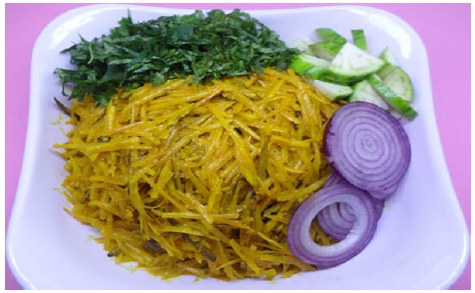
Traditional abacha-ncha prepared by women for the Ikeji masquerade cult (Retrieved March 26, 2023, from https://allnigerianfoods.com/african-salad)
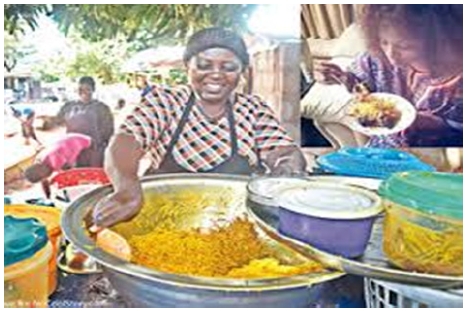
A woman preparing abacha-ncha. (Retrieved March 21, 2023, from https://tribuneonlineng.com/lovers-abacha/)
In addition, Nde-Eni Asaa communities have an uncommon affiliation with the traditional Orie market. The Igbos of Southeast Nigeria and their closest neighbors have four native market days that are referred to as Izu (week)—Eke, Orie, Afor, and Nkwo. These native market days are significant in Igbo culture and tradition. Traditional Igbo communities have their various respective market days within these four market days for local economic activities. However, both the diasporic and the home-based Aros have a strong affiliation with the Orie market, meaning it represents more than just a commercial rendezvous. This explains why an Orie market exists in all diasporic Aro communities across southeastern Nigeria and other parts of the country. In these diasporic communities, the Orie market is run by women. Women, drawn from the Alutaradi and Umuada, control the leadership of the respective Orie markets within Nde-Eni Asaa communities in Orumba district. Commodities such as fruit, vegetables, cooking oil, and traditional food condiments are sold in the market and most women come to these markets to exchange pleasantries and show they are well. In Nde-Eni Asaa communities, the Orie market has a symbolic connection to the Ikeji masquerade festival, as the Ikeji masquerade festival commences on Orie Market Day and terminates on the following Orie Market Day. On the last Orie Market Day when the festival is meant to end for a given year, the masquerades perform a unique ritual called Izu Orie (see Figure 7 below). This ritual implies that masquerades visit the Orie Market to trade. This special ritual is compulsory for all masquerades and their respective followers (Okeke: Key Informant 10, March 7, 2021). They trade and show off in the Orie market without scaring the women. Women interact with them without fear in the comfort of their shops; hence, they are temporarily treated as members of the masquerade cult. This indicates the end of the annual festival for a given year.
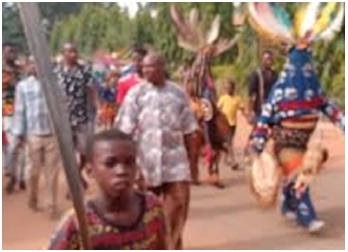
Ikeji masquerade cult members on their way to the Orie market for the Izu Ahia ritual in Ndiowu community. (Retrieved March 17, 2023, from https://alahajimchamzy/ndiowu-ikeji-festival-2022/)
It can be deduced that, through this practice, the Ikeji masquerade cult derives strength from the women. For instance, one of the informants noted that if the spirit of the masquerade cult does not visit the Orie market, it will not go back to the spirit world to wait for the Ikeji festival of the following year (Kanu A: Key Informant 5, June 17, 2021). Many male informants confirmed this, except for a few who affirmed that they did not believe in the existence of any spirits in the Ikeji masquerade cult, citing their Christian beliefs. Many members of the cult believe that the emergence of a foreign religion in postcolonial Igbo society has not helped the sustainability of the masquerade cult among Nde-Eni Asaa communities. Regardless, the above extract shows women in the Nde-Eni Asaa communities participate in the Ikeji masquerade cult inthesensethat they significantly impact its sustainability.
Furthermore, during the research, it was found that, traditionally, older women (okenye nwanyi in the local dialect) in the area are allowed to see the Ikeji masquerade without being scared or punished, unlike the case of younger women. This is another puzzle as it relates to membership of the masquerade cult, from which women are barred. Traditionally, the Ikeji masquerade cult is reserved exclusively for men. Women and other men who are not members of the masquerade cult are traditionally not permitted to interact with or participate in masquerade displays as this would be viewed as sacrilege among Nde-Eni Asaa communities (Kanu O: Key Informant 6, February 21, 2021). However, responses from various categories of informants, including data from participants’ observations, revealed that older women (70 years and above) who have long reached menopause and will therefore not menstruate again are assumed to have crossed over and are ranked as men in the community. Members of the masquerade cult do not segregate such women during their cult activities. Unlike other women, who are still of a childbearing age, they can sit down with men to eat cola nuts.
The Ikeji masquerade cult holds such women in regard, especially when they are of impeccable character. Members of the cult seek advice from such women in the community whenever younger women defile cultural traditions. Women of questionable character are not accorded the same respect by the masquerade cult, regardless of their age. They are considered defiled entities awaiting a shameful death. This is mostly when such women are known in the community for an adulterous lifestyle, murder, or other serious and sacrilegious offences. From the above assertions, it can be deduced that older women of impeccable character were respected and consulted by members of the Ikeji masquerade cult in the now-defunct Aro hegemony . Willis (2014) and Okoro (2022) shared this view, noting that women play a significant role in most traditional activities in African communities, including the masquerade.
Conclusion
The results of this study show that women make specific contributions to the sustainability of the age-long Ikeji masquerade of the Nde-Eni Asaa diasporic Aro communities in Anambra State in terms of ritual practices, celebrations, commencement, and conclusion of the festival, including the settlement of disputes for the masquerade cult members.
Moreover, there is a significant relationship between the results of this study and postulations of postmodern feminism. This is because the generalized position of women in post-colonial Igbo society in Nde-Eni Asaa communities has not helped establish the relationship between the women and the Ikeji masquerade cult. A specific understanding of women’s individual roles within the Igbo cultural milieu would place them in proper perspective for rural development. However, this study uses the strength of postmodern feminism to debunk existing claims in the literature and oral information regarding men in traditional African society to establish that specific consideration of women as individuals would position women for greater impact in traditional African society.
This study has some limitations. For instance, it has not been able to establish relationships involving other diasporic Aros communities within Southeast Nigeria and other parts of the defunct Aro hegemony, where the Ikeji masquerade cult is also practiced. Further investigations beyond Ikeji will establish the relationships between women and other notable masquerade cults in Southeast Nigeria, such as Okponsi, Owuh, Omabe, and Odo. In addition, further studies would also establish the actual meaning of the word Eni and its connotation with women among the Aros. However, findings from this study and related future studies will gradually rewrite the ontology of women as it concerns rituals, culture, and religious traditions in postcolonial Igbo society.
References
-
Adebayo, A. O. (2021). Yoruba African women and patriarchal excesses in the context of globalization and Sustainable Development Goals. Asian Women, 37(3), 95–120.
[https://doi.org/10.14431/aw.2021.9.37.3.95]

- Afigbo, A. E. (1981). Ropes of sand: Studies in Igbo history and culture. Ibadan: University Press.
- Agujiobi, E. (2020). The place of women in a male-dominated culture: The Nsukka (Igbo) experience. Sapientia Foundation Journal of Education, Science and Gender Studies, 2(1), 64–71.
-
Amaechi, C. M., & Muo, O. M. (2018). Women and development in Africa: Urbanization and the role of Umuada in Igboland, Southeast Nigeria. Asian Women, 34(1), 85–107.
[https://doi.org/10.14431/aw.2018.03.34.1.85]

-
Artwinska, A., & Mrozik, A. (2020). Gender, generations, and communism in Central and Eastern Europe and beyond. London: Routledge.
[https://doi.org/10.4324/9780367823528]

- Bentor, E. (1995). Aro Ikeji festival: Toward a historic interpretation of a masquerade festival (unpublished doctoral dissertation). Indiana University.
- Butler, J. (1990). Gender trouble: Feminism and subversion of identity. New York: Routledge
-
Carlson, A. B. (2019). In the spirit and in the flesh: Women, masquerades, and the Cross River. African Arts, 52(1), 46–61.
[https://doi.org/10.1162/afar_a_00446]

-
Chidiume, C. G., & Nmaju, U. U. (2019). The Aro hegemony: Dissecting the myth and reality. Journal of Tourism and Heritage Studies, 8(1), 76–87.
[https://doi.org/10.33281/JTHS20129.2019.1.6]

- Dike, K. O., & Ekejiuba, F. I. (1990). The Aro of South-eastern Nigeria 1650-1980: A study of socio-economic formation and transformation in Nigeria. Ibadan: University Press Ltd.
-
Gagliardi, S. E. (2018). Seeing the unseeing audience: Women and West African power association masquerades. Africa, 88(4), 744–767.
[https://doi.org/10.1017/S0001972018000451]

-
Gambaudo, S. A. (2007). French feminism vs Anglo-American feminism: A reconstruction. European Journal of Women Studies, 14(2), 93–108.
[https://doi.org/10.1177/1350506807075816]

- Ijoma, J. O. (1994). The Aro and their neighbours: A reconstruction of the historiography. Nigerian Heritage, 4, 36–49.
- Ijoma, J. O., & Njoku, O. N. (1991). High point of Igbo civilization: The Arochukwu period. In A. E. Afigbo (Ed.), Groundwork of Igbo history (431-449). Lagos Vista Books.
- Isichei, E. (1973). A history of the Igbo people. London: Macmillian.
- Jones, G. I. (1981). From slaves to palm oil: Slave trade and palm oil trade in the Bight of Biafra. Cambridge, UK: African Studies Center.
- Kanu, I. A. (2017). Ikeji festival of Arondizuogu: Retelling the stories and rekindling the values of an ancestral homeland. International Journal of Religion and Human Relations, 9(1), 156–179.
-
Linda, R. A., & Salo, C. (2002). The framing of feminists feminism in news and public affairs programs in U.S. electronic media. Journal of Communication, 52, 211–228.
[https://doi.org/10.1111/j.1460-2466.2002.tb02540.x]

-
Maynard, M. (1995). Beyond the ‘Big Three’: The development of feminism theory into the 1990’s. Women’s History Review, 4(3), 259–281.
[https://doi.org/10.1080/09612029500200089]

- Mendus, S. (2005). Feminism. In T. Honderich (Ed.), The Oxford companion to philosophy. 2nd Edition (pp. 291–294). London: Oxford University Press.
- Njoku, N. L. (2016). The dual image of the Aro in Igbo development history: An aftermath of their role in the slave trade. Journal of Retracing Africa, 2(1), 29–48. http://encompass.eku.edu/jora/
-
Northrup, D. (1978). African mortality in the suppression of the slave trade: The case of the Bight of Biafra. Journal of Interdisciplinary History, 19(1), 47–64.
[https://doi.org/10.2307/203668]

-
Nwabueze, E. (1984). Igbo masquerade performance and the problem of alien intervention: Transition from cult to theatre. Ufahamu, 14(1), 75–92.
[https://doi.org/10.5070/F7141017067]

- Nwaezeigwe, N. T. (2013). The Aro and the concept of Aro-Okigbo: Facts and fallacies of a historic Igbo hegemony. Ikenga: International Journal of African Studies, 15, 1–12.
- Nwankwo, E. A. (2013). Safety and security measures in the heritage industry of Eastern Nigeria (unpublished doctoral dissertation). University of Nigeria: Nsukka.
- Nwankwo, J. C. (1973). The early settlement of Ndikelionwu and its neighborhood (unpublished Batchelor’s project). University of Nigeria, Nsukka.
- Nwauwa, A. O. (1995). The evolution of the Aro Confederacy in Southeastern Nigeria, 1690-1710: A theoretical synthesis of state formation process in Africa. Anthropos, 4(6), 353–364.
-
Nwanna, C. (2017). Managing masquerade festivals for tourism and economic gains: A study of mmanwu festival in Anambra State. Sociology and Anthropology, 5(7), 556-561.
[https://doi.org/10.13189/sa.2017.050706]

- Nwokeji, G. U. (1999). The Biafran frontier: Trade, slaves and Aro society, c. 1750-1905 (unpublished doctoral dissertation). University of Toronto.
- Okonkwo, U. U. (2011). The Aro, host communities and continuities in intergroup suspicion in the Oguta Area since pre-colonial times. Afro-Asian Journal of Social Sciences, 2(2), 1–19.
- Okoro, J. G. (1985). A brief history of Arondizuogu. Aba, Nigeria: Precision Graphics.
-
Okoro, M. N. (2022). Women in the Igbo culture: Extrapolation from Nsukka, South-East Nigeria. Asian Women, 38(1), 77–106.
[https://doi.org/10.14431/aw.2022.3.38.1.77]

- Okoronkwo, C., & Okorafor, G. F. (2019). Value of masquerade in Igbo land: A study of Ikeji Festival Arondizuogu. International Journal of Strategic Research in Education, Technology and Humanities, 7(1), 92–104.
- Onwuejeogwu, M. A. (1987, November). Evolutionary trends in the history of the development of the Igbo civilization in the culture theatre of Igboland in Southeast Nigeria. Paper presented at the Annual Ahianjoku Lecture. State Ministry of Information, Owerri, Imo, Nigeria.
-
Opata, C. C. (2020). Cultural restrictions, respect for women, and environmental sustainability in Africa: Extrapolations from Igboland, South-eastern Nigeria. Asian Women, 36(1), 25–43.
[https://doi.org/10.14431/aw.2020.3.36.1.25]

-
Reed, B. (2005). Spirits incarnate: Cultural revitalization in a Nigerian masquerade festival. African Arts, 38(1), 50–62.
[https://doi.org/10.1162/afar.2005.38.1.50]

- Roberts, J. (2017). Women’s work. Distillations, 3(1), 6–11.
- Roseneil, S. (1995). Disarming patriarchy: Feminism and political action at Greenham. London: Open University Press.
-
Willis, J. T. (2014). Negotiating gender, power, and spaces in masquerade performances in Nigeria. Gender, Place & Culture, 21(3), 322–336.
[https://doi.org/10.1080/0966369X.2013.781013]

- Ugonna, N. (1984). Mmonwu: A dramatic tradition of the Igbo. Lagos: The University of Lagos Press.
-
Yoshida, K. (1993). Masks and secrecy among the Chewa. African Arts, 26(2), 39–45.
[https://doi.org/10.2307/3337131]

Oral Sources from Key Informant Interviews
- Amazu, K. (2021, August 21). Aged c.80, she is the head of alutaradi (married women) in Oguagwumba Kindred in Ndiowu. Interviewed in her Ndiowu residence, Anambra State, Nigeria. (Key Informant-1)
- Chiugo, A. (2020, March 5). Aged c.71, he is the traditional head of the Oguagwumba Kindred in Ndiowu. Interviewed in his residence in Ndiowu, Anambra State, Nigeria. (Key Informant-2)
- Chidiume, S. (2021, August 2). Aged c.65, he is one of the members of the Ikeji masquerade cult in Ndiokpaleze. Interviewed in his Ndiokpaleze residence in Anambra State, Nigeria. (Key Informant-3)
- Ezeokpala, F. (2020, March 28). Aged c.64, he is one of the members of the Ikeji masquerade cult in Ndiokpaleke. Interviewed in his Ndiokpaleke residence in Anambra State, Nigeria. Key Informant-4).
- Kanu, A. (2021, June 17). Aged c.81, he is one of the custodians of the Ikeji masquerade cult in Arochukwu. Interviewed in his Arochukwu residence in Abia State, Nigeria. (Key Informant-5)
- Kanu, O. (2021, February 21). Aged c.76, he is one of the members of the Ikeji masquerade cult in Ajalli. Interviewed in his residence in Ajalli, Anambra State, Nigeria. (Key Informant-6)
- Ndukwe, D. (2020, April 7). Aged c.82, she is one of the alutaradi (married women) in Ajalli. Interviewed in her Ajalli residence in Anambra State, Nigeria. (Key Informant-7)
- Nwajagu, M. (2020, March 8). Aged c.68, he is one of the custodians of the Ikeji masquerade cult in Ndiokpaleke. Interviewed in his residence in Ndiokpaleke, Anambra State, Nigeria. (Key Informant-8)
- Nwankwonnanna, A. (2018, March 6). Aged c.86, he is the Akajiofor (oldest man) in the Oguagwumbah Kindred in Ndiowu. Interviewed in his Ndiowu residence, Anambra State, Nigeria. (Key Informant-9)
- Okeke, C. (2021, March 7). Aged c.75, he is one of the members of the Ikeji masquerade cult in Ndiukwuenu. Interviewed in his residence in Ndiukwuenu, Anambra State, Nigeria. (Key Informant-10)
- Okekeifih, A. (2021, June 19). Aged c.66, he is one of the members of the Ikeji masquerade cult in Arochukwu. Interviewed in his Arochukwu residence in Abia State, Nigeria. (Key Informant-11)
- Okoli, B. (2020, April 4). Aged c.80, she is the head of umuada (daughters) in Ndiokolo. Interviewed in her residence in Ndiokolo, Anambra State, Nigeria. (Key Informant-12.
- Okonkwo, C. (2021, March 9). Aged c.75, she is one of the members of alutaradi (married women) in Ndiokpaleze. Interviewed in her Ndiokpaleze residence in Anambra State, Nigeria. (Key Informant-13)
- Okoroafor, S. (2021, February 19). Aged c.69, she is one of the heads of alutaradi (married women) in Arochukwu. Interviewed in her residence in Arochukwu, Abia State, Nigeria. (Key Informant-14)
- Okoroijoma, P. (2021, February 22). Aged c.78, he is one of the custodians of the Ikeji masquerade cult in Arochukwu. Interviewed in his Arochukwu residence in Abia State, Nigeria. (Key Informant-15)
- Onunkwo, P. (2021, March 23). Aged c.80, she is a member of the ‘Umuada’ (daughters) in Ndike. Interviewed in her Ndike residence in Anambra State, Nigeria. (Key Informant- 16)
Biographical Note: Elochukwu A. Nwankwo Phd is currently a lecturer in the Department of Archaeology and Tourism, University of Nigeria. He specializes in heritage studies, heritage tourism and cultural studies. He has published extensively in these research areas in reputable journals, with active participation in learned conferences. Dr. Nwankwo focuses his research on the Southeastern part of Nigeria (otherwise known as the Igbo area of Nigeria). The area is predominantly dominated by the Igbo speaking ethnic group in Nigeria. Elochukwu teaches and supervises both Postgraduate and Undergraduate students in the Department of Archaeology and Tourism University of Nigeria Nsukka. He is happily married with children.
